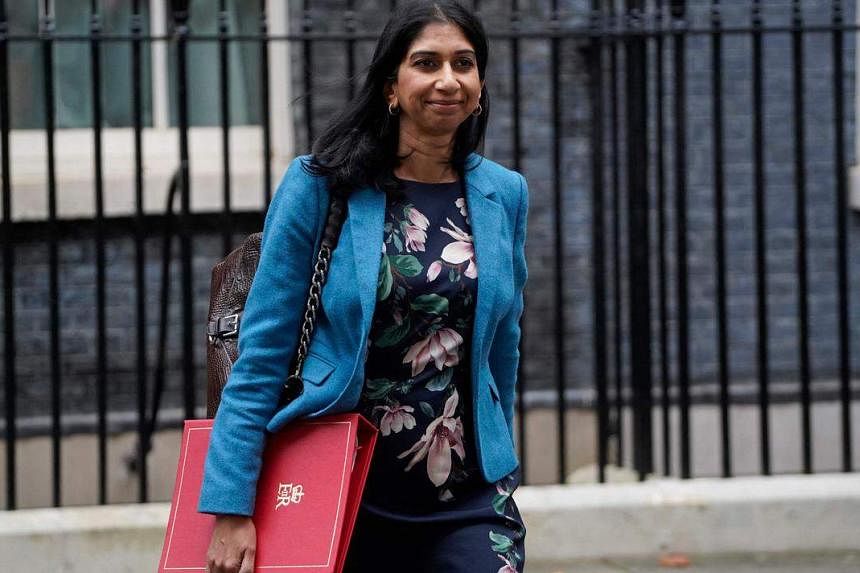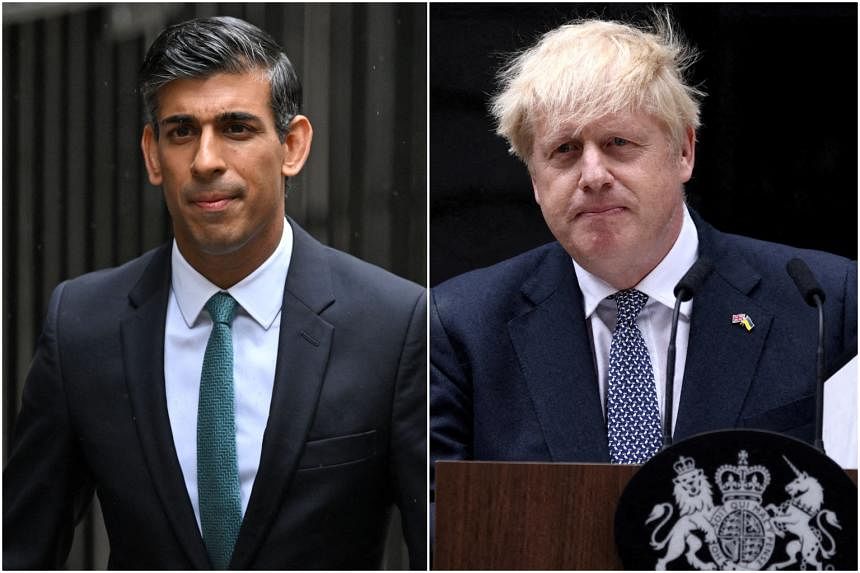LONDON – Mr Rishi Sunak walked into Mr Boris Johnson’s makeshift campaign headquarters last weekend to see if the two colleagues-turned-adversaries could pull off what would have been the UK political deal of the century.
Those present described it like a scene from a gangster movie, filmed halfway up a skyscraper in Westminster. Two bosses with years of explosive history between them entered under the cover of darkness, leaving their chief lieutenants in a hallway to try to thrash out a peace in a spartan room.
Their failure left Mr Sunak to become Conservative Party leader – and Britain’s youngest prime minister in more than 200 years – uncontested. But the talks and their aftermath laid bare Tory divisions that he will struggle to overcome.
Just days earlier, their encounter would have been unthinkable. Mr Johnson blames Mr Sunak for his downfall as prime minister in July, while Mr Sunak wears his resignation as Chancellor of the Exchequer then as a badge of honour in the face of scandal after scandal presided over by Mr Johnson as his premiership imploded.
But a sniff of power changes political calculations. And after Mr Johnson’s successor in 10 Downing Street, Ms Liz Truss, torpedoed her own premiership in record time, the warring Conservative Party was desperate for a show of unity.
Those familiar with the Johnson-Sunak meeting say it was a genuine attempt to do so. Over nearly two hours, their talks centered on whether a triumvirate could be formed with Mr Sunak, Mr Johnson and Ms Penny Mordaunt, the other leadership contender, taking senior positions to satisfy the various factions.
Broken party
Mr Johnson’s camp thought it could, as one MP said, put Humpty Dumpty together again by satisfying Conservative voters from 2019, as well as his allies in Parliament and grassroots Tories calling for his comeback. Mr Sunak’s team privately believed Mr Johnson would command the support of as many as 140 Tory MPs, especially from the right of the party, so a detente with Mr Sunak’s more moderate followers would solve the question of parliamentary party unity.
Yet both insisted they had to be prime minister, and negotiations collapsed. Mr Johnson later pulled out of the race, leaving allies to say he will support Mr Sunak’s government while pushing it to meet manifesto commitments made by the former premier in the 2019 general election.
Without Mr Johnson on board, Mr Sunak’s premiership is built on an uneasy truce with the pro-Brexit, ideological right wing of the party – which MPs privately fear will end in yet more infighting. Within hours of his meeting with Mr Johnson, Mr Sunak won the endorsement of former Home Secretary Suella Braverman, the self-appointed “Queen of the Brexiteers”.
That virtually guaranteed a Mr Sunak victory but has caused him trouble ever since. On his first day in office, the cost of Mrs Braverman’s backing was made clear when the new premier controversially reappointed her as home secretary, less than a week after she was fired by Ms Truss over a security breach.
Braverman fallout
Allies praised Mr Sunak’s decision as proof the clean-cut new premier can do cut-throat politics. Critics - including some Tory MPs - criticised what they called a lack of judgment and said Mr Sunak had destroyed any claim to run a government of “integrity” within hours of taking power.
One Cabinet minister said it is inevitable Mrs Braverman would be the first to leave Mr Sunak’s government. Some of the prime minister’s supporters are sanguine about that, suggesting he would be relaxed about replacing her with a more natural ally such as Kemi Badenoch or Robert Jenrick.

Others in government say the issue highlights the precarious balance Mr Sunak struck with the Tory right that would not last if she is forced out.
Mrs Braverman fell out with Ms Truss due to the home secretary’s hardline approach on immigration, which contrasted with the former premier’s obsession with growth. Her posturing also jeopardised a trade deal with India that would likely mean the UK granting more business and student visas.
Looming battles
One official predicted these policy disagreements would continue. Mr David Frost, another key figure on the Tory right who now makes most of his interventions in the Telegraph newspaper, has suggested his support for the Mr Sunak administration is conditional on the premier taking a tough line on immigration.
It’s not the only area of conflict. Mr Sunak’s decision to reintroduce a fracking ban caused private fury among Tory MPs who support it as a way to boost energy security without backing a green agenda. Brexiteers accused Mr Sunak of betraying a campaign pledge following the revelation that the government is dropping a commitment to swiftly get all retained EU law off the statute book.
The European Research Group, effectively the party’s Brexiteer caucus, gave Mr Sunak four conditions for their support, including appointing former Johnson and Truss aide David Canzini as his chief of staff. But he did not agree, and they ended up not backing any candidate.
Instead, Mr Sunak has given key positions to experienced politicians from the David Cameron and George Osborne austerity era, including many of its plotters and trouble-makers. Mr Gavin Williamson – who will attend Cabinet as a minister without portfolio – is described by Tory MPs as Sunak’s de facto chief whip, or parliamentary enforcer.
Mr Sunak also appointed close friends to key departments. Mr Steve Barclay is in charge of health, Mr Mark Harper is at transport, Mr Grant Shapps runs the business department and Ms Gillian Keegan is at education. The idea is to help the government manage spending cuts without Cabinet splits, an ally said.
But one Tory MP, who was overlooked for promotion, said the new lineup – coupled with looming tax rises and spending cuts – would mean the Tories again being seen as the nasty party. With the Conservatives trailing Labour by a record deficit in many opinion polls, the fear is a fresh round of austerity will lead to an election wipeout.
On Friday, Mr Sunak got an early glimpse of the risks. During a hospital visit in south London, the prime minister asked one patient if nurses are looking after her. “They always do, it’s a pity you don’t pay them more,” she replied. BLOOMBERG

